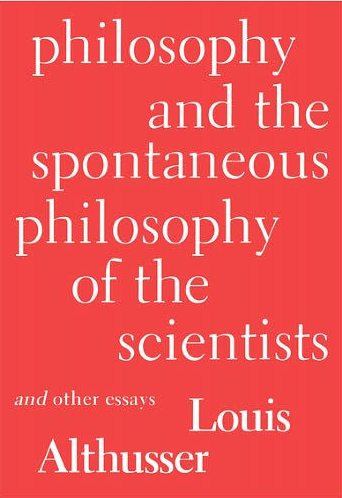Newly released
This book is new and will be uploaded as soon as it becomes available to us and if we secure the necessary publishing rights.

Philosophy and the Spontaneous Philosophy of the Scientists Book PDF
(0)
Author:
Louis AlthusserNumber Of Reads:
154
Language:
English
Category:
Social sciencesSection:
Pages:
189
Quality:
excellent
Views:
1129
Quate
Review
Save
Share
Book Description
Philosophy and the Spontaneous Philosophy of the Scientists: And Other Essays
The publication in 1965 of For Marx and Reading Capital established Louis Althusser as one of the most original and controversial figures in the Western Marxist tradition; a thinker whose renewal of Marxism was to enjoy great influence over the next decade.
Collected here are Althusser’s most significant philosophical writings from 1965 to 1978; the majority previously untranslated. Intended to contribute, in his own words, to a “left-wing critique of Stalinism that would help put some substance back into the revolutionary project here in the West,” they are the record of a shared history. At the same time they chart Althusser’s critique of the theoretical system unveiled in his own major works, and his developing practice of philosophy as a “revolutionary weapon.”
The collection opens with two lucid early articles “Theory, Theoretical Practice and Theoretical Formation” and “On Theoretical Work.” The title piece Althusser’s celebrated lectures in the “Philosophy Course for Scientists” is the fullest exploration of his new definition of philosophy as politics in the realm of theory; a conception which is further developed in “Lenin and Philosophy.” “Is it Simple to be a Marxist in Philosophy?” provides an invaluable account of Althusser’s intellectual development. The volume concludes with two little-known late pieces “The Transformation of Philosophy,” in which the paradoxical history of Marxist philosophy is investigated; and “Marxism Today,” a sober balance-sheet of the Marxist tradition.
Attesting to the unique place which Althusser has occupied in modern intellectual history between a tradition of Marxism which he sought to reconstruct, and a “post-Marxism” which has eclipsed its predecessor these texts are indispensable reading.
"A famous title of Engels's underscores the essential distinction between Marxism and previous socialist doctrines: before Marx, socialist doctrines were merely utopian ; Marx's doctrine is scientific. What is a utopian socialist doctrine? It is a doctrine which proposes socialist goals for human action, yet which is based on non-scientific principles, deriving from religious, moral or juridical, i.e. ideological, principles. The ideological nature of its theoretical foundation is decisive, because it affects how any socialist doctrine conceives of not only the ends of socialism, but also the means of action required to realize these ends. Thus, utopian socialist doctrine defines the ends of socialism - the socialist society of the future - by moral and juridical categories; it speaks of the reign of equality and the brotherhood of man; and it translates these moral and legal principles into utopian - that is, ideological, ideal and imaginary - economic principles as well: for example, the complete sharing-out of the products of labour among the workers, economic egalitarianism, the negation of all economic law, the immediate disappearance of the State, etc. In the same manner it defines utopian, ideological and imaginary economic and political means as the appropriate means to realize socialism: in the economic domain, the workers' co-operatives of Owen, the phalanstery of Fourier's disciples, Proudhon's people's bank; in the political domain, moral education and reform - if not the Head of State's conversion to socialism. In constructing an ideological representation of the ends as well as the means of socialism"
Louis Althusser
Louis Pierre Althusser (French: 16 October 1918 – 22 October 1990) was a French Marxist philosopher. He was born in Algeria and studied at the École normale supérieure in Paris, where he eventually became Professor of Philosophy.Althusser was a long-time member and sometimes a strong critic of the French Communist Party (Parti communiste français, PCF). His arguments and theses were set against the threats that he saw attacking the theoretical foundations of Marxism. These included both the influence of empiricism on Marxist theory, and humanist and reformist socialist orientations which manifested as divisions in the European communist parties, as well as the problem of the cult of personality and of ideology. Althusser is commonly referred to as a structural Marxist, although his relationship to other schools of French structuralism is not a simple affiliation and he was critical of many aspects of structuralism.Althusser's life was marked by periods of intense mental illness. In 1980, he killed his wife, the sociologist Hélène Rytmann, by strangling her. He was declared unfit to stand trial due to insanity and committed to a psychiatric hospital for three years. He did little further academic work, dying in 1990.
Book Currently Unavailable
This book is currently unavailable for publication. We obtained it under a Creative Commons license, but the author or publisher has not granted permission to publish it.
Rate Now
5 Stars
4 Stars
3 Stars
2 Stars
1 Stars
Philosophy and the Spontaneous Philosophy of the Scientists Quotes
Top Rated
Latest
Quate
Be the first to leave a quote and earn 10 points
instead of 3
Comments
Be the first to leave a comment and earn 5 points
instead of 3